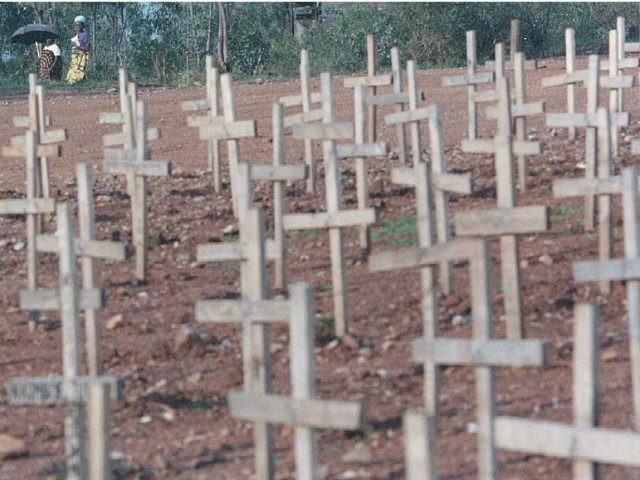A burial ceremony was held on Sunday at the Ruhanga Genocide Memorial for 157 victims of the 1994 atrocity in Rwanda, the latest repetition of an observance held on April 15 of every year.
Over 800,000 members of the Tutsi ethnic minority were murdered by the majority Hutus in the Rwandan genocide, while another two million refugees fled the country. The Ruhanga Genocide Memorial was built on the site of a former Anglican church where an estimated 25,000 people were killed. A mass grave on the site holds the bodies of over 36,000 victims of the genocide.
“It was always a challenge that our people could not get a decent burial, we have been searching for them. Now that we found them, we pray that they rest in peace and we will continue to push so we get the remains of other relatives as well,” a man named Gerard Mudahemuka who lost family members in the genocide told the New Times of Rwanda.
As the New Times explains, the wave of murders spread across Rwanda so quickly, producing so many mass executions and unmarked graves, that to this day the remains of many victims are still unaccounted for.
Thousands attended the ceremony on Sunday and told stories of the genocide, including some who survived the massacre at the church where the memorial now stands.
“People killed neighbors they had lived and shared with for generations, husbands killed their wives and children, men killed their in-laws and vice versa,” Senator Tito Rutaremara recalled.
Rwandans who still live outside the country gathered over the weekend for commemorations. At an event at the United Nations headquarters in Nairobi last week, Josephine Murebwayire Yozafina remembered fleeing to a seminary with her husband, six children, and two brothers after soldiers and militia members robbed the family and warned they would be killed. The seminary was attacked by hundreds of militia fighters who slaughtered almost everyone inside, including everyone from Yozafina’s family. She survived only because she was covered in blood from her wounds and left for dead.
Rwanda’s ambassador to Kenya, James Kimonyo, noted at the Nairobi event that “many of those who committed this heinous crime in Rwanda are still at large,” and asked other nations to swiftly extradite accused perpetrators to his country for trial.
One such perpetrator appears to be on his way: a Rwandan man who resettled in Denmark in 2001 and eventually gained citizenship, only to be arrested last year when Rwanda requested his extradition. A Danish court ruled in favor of his extradition last week.
Humanitarian group Doctors Without Borders, which had personnel on the scene in Rwanda in 1994 and lost staff members to the violence, commemorated the genocide in early April by spotlighting current staff members from Rwanda who survived the slaughter as children.

COMMENTS
Please let us know if you're having issues with commenting.